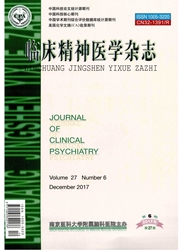

 中文摘要:
中文摘要:
目的:通过研究双相Ⅱ型抑郁障碍患者伴攻击行为的应对方式和社会支持的关系,为具有攻击行为的心理干预提供科学的理论依据。方法:采用自编一般情况问卷、外显版攻击行为量表(MOAS)、简易应对方式问卷(SCSQ)及社会支持评定量表(SSRS)对新疆自治区人民医院临床心理科及新疆精神卫生中心愿意接受研究的78例汉族双相Ⅱ型抑郁障碍患者进行调查。结果:攻击组(MOAS≥4分,38例)积极应对分[(12.31±7.28),P〈0.05]低于非攻击组(MOAS〈4分,40例)(16.15±6.95);攻击组消极应对分[(13.29±5.28),P〈0.05]显著高于非攻击组(10.68±4.07)。攻击组社会支持总分、主观支持及支持利用度均显著低于非攻击组(P〈0.05或P〈0.01)。结论:具有攻击行为的双相障碍患者消极应对方式更多,积极应付方式较少,其社会支持度也比较低。
 英文摘要:
英文摘要:
Objective: To explore the correlation between coping style and social support in depression episode of bipolar Ⅱ disorders with aggressive behavior,and to provide foundation of intervention in bipolar disorder patients with aggression. Method: Seventy eight patients of Xinjiang mental health centers and department of clinical psychology,people's hospital of Xinjiang Uygur autonomous region were investigated by a selfcompiled inventory,modified overt aggression scale( MOAS),Simple Coping Style Questionnaire( SCSQ) and Social Support Rating Scale( SSRS). Results: The aggressive group got significantly lower scores of positive coping( 12. 31 ± 7. 28) than non-aggressive group[( 16. 15 ± 6. 95),P〈0. 05]. The aggressive group got significantly higher scores of Negative coping( 13. 29 ± 5. 28) than non-aggressive group [( 10. 68 ± 4. 07),P〈0. 05]. Aggressive group degree of social support,subjective support and support utilization were significantly lower than the non-aggressive group( P〈0. 05). Conclusion: Study shows that bipolar disorder patients with aggressive behavior have more Negative coping and less positive coping than the patients without aggressive behavior. and their social support degree is lower.
 同期刊论文项目
同期刊论文项目
 同项目期刊论文
同项目期刊论文
 期刊信息
期刊信息
